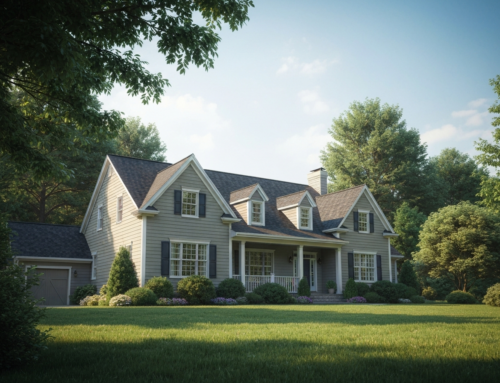Understanding Coastal Carolina’s Unique Home Insurance Needs
Coastal Carolina, with its stunning beaches and vibrant communities, offers a unique lifestyle. However, this beautiful region also presents specific challenges when it comes to home insurance. Understanding these challenges is the first step in securing the right coverage and protecting your property.
One of the primary concerns is the area’s vulnerability to hurricanes and tropical storms. The coastline is exposed, making properties susceptible to wind and flood damage. Standard homeowners insurance policies often exclude flood coverage, necessitating a separate flood insurance policy. Residents also need to be aware of hurricane deductibles, which can be significantly higher than standard deductibles.
Another factor influencing home insurance in Coastal Carolina is the potential for rising sea levels and coastal erosion. These long-term environmental changes can increase the risk of property damage and impact insurance premiums. Older homes, which may not be built to current building codes, can also face higher insurance costs due to their increased vulnerability to damage.
Furthermore, the warm, humid climate can contribute to issues like mold growth and termite infestations, which can lead to costly repairs. While some homeowners policies offer limited coverage for these issues, it’s essential to understand the specific terms and conditions. Coastal homeowners should consider preventative measures to minimize these risks.
Coastal Carolina’s unique environmental conditions demand a tailored approach to home insurance. Residents need to consider factors such as flood risk, hurricane vulnerability, and the age and construction of their homes when selecting a policy. Understanding these unique needs is the first step toward comprehensive protection.
For more insights on flood risk, explore our article on how to complete a flood risk assessment.
Why Local Expertise Matters: Coastal Carolina Home Insurance Experts Explained
When it comes to protecting your home in Coastal Carolina, working with local insurance experts can make all the difference. These professionals possess in-depth knowledge of the region’s specific risks and insurance requirements, allowing them to provide tailored advice and coverage options.
Local Coastal Carolina Home Insurance Experts understand the nuances of coastal living, including the varying levels of flood risk in different areas, the impact of wind mitigation measures, and the complexities of hurricane deductibles. They can assess your property’s specific vulnerabilities and recommend the appropriate level of coverage to address them.
Unlike national insurance providers, local experts are familiar with local building codes, zoning regulations, and community-specific risks. This knowledge allows them to provide more accurate and relevant insurance quotes. They can also help you navigate the often-complicated claims process, advocating on your behalf to ensure a fair and timely resolution.
Moreover, local insurance agents often have established relationships with local contractors and repair professionals. This can be invaluable in the event of a disaster, as they can connect you with trusted and reliable service providers to help you restore your property.
Choosing Coastal Carolina Home Insurance Experts means gaining access to personalized service and expert advice. These professionals are committed to helping you protect your home and financial well-being, providing peace of mind in a region prone to natural disasters. Working with a local expert ensures that you have a trusted partner who understands your unique needs and can guide you through the complexities of home insurance in Coastal Carolina.
Consider a coverage review to ensure your policy still meets your needs. Learn more at what’s a coverage review and why do I need one?
Decoding Your Home Insurance Policy: Key Coverages You Need
Understanding the intricacies of your home insurance policy is crucial for ensuring adequate protection. Many homeowners are unaware of the specific coverages included in their policies and the limitations that may apply. Decoding your policy and familiarizing yourself with the key coverages is essential for making informed decisions and avoiding unpleasant surprises in the event of a claim.
One of the most important coverages is dwelling coverage, which protects the physical structure of your home, including the walls, roof, and foundation. It’s crucial to ensure that your dwelling coverage is sufficient to rebuild your home in the event of a total loss. Replacement cost coverage is preferable to actual cash value, as it will cover the full cost of rebuilding without deducting for depreciation.
Personal property coverage protects your belongings inside the home, such as furniture, clothing, and electronics. This coverage typically has limits for certain items, such as jewelry and collectibles, so it’s essential to review these limits and consider purchasing additional coverage if needed.
Liability coverage protects you financially if someone is injured on your property and sues you. This coverage can help cover medical expenses, legal fees, and settlements. It’s important to have sufficient liability coverage to protect your assets in the event of a lawsuit. Consider an umbrella insurance policy for additional liability protection.
Loss of use coverage provides reimbursement for additional living expenses if your home is uninhabitable due to a covered loss. This coverage can help cover the cost of hotel stays, meals, and other necessary expenses while your home is being repaired. For a more in-depth look, check out our article on loss of use coverage explained.
Understanding the exclusions in your policy is just as important as understanding the coverages. Common exclusions include flood damage, earthquake damage, and damage caused by pests or rodents. If you live in an area prone to these risks, you may need to purchase separate insurance policies to protect yourself.
Ultimately, a well-understood home insurance policy is your first line of defense against financial loss due to unforeseen circumstances. By carefully reviewing your policy and understanding the key coverages, you can ensure that you have the protection you need to safeguard your home and financial future.
Navigating Hurricane Season: Protecting Your Home from Storm Damage
Hurricane season in Coastal Carolina demands proactive measures to protect your home from potential storm damage. Preparing your property and understanding your insurance coverage are essential steps in mitigating the risks associated with these powerful weather events.
One of the most crucial steps is to create a comprehensive hurricane preparedness plan. This plan should include securing loose objects around your property, such as patio furniture and garbage cans, trimming trees and shrubs to prevent them from falling on your home, and reinforcing windows and doors with storm shutters or plywood.
It’s also important to inspect your roof regularly for any signs of damage, such as missing or damaged shingles. A damaged roof can be particularly vulnerable during a hurricane, allowing water to penetrate and cause significant damage to the interior of your home.
Understanding your hurricane deductible is also critical. This is the amount you’ll have to pay out of pocket before your insurance coverage kicks in for hurricane-related damages. Hurricane deductibles are often higher than standard deductibles and can be a significant expense.
Flood insurance is another essential consideration for Coastal Carolina homeowners. Standard homeowners insurance policies typically do not cover flood damage, so you’ll need to purchase a separate flood insurance policy if you live in a flood-prone area. Consider reading up on flood insurance availability and coverage.
In addition to physical preparations, it’s important to review your insurance policy to ensure that you have adequate coverage for potential hurricane damage. Make sure you understand the terms and conditions of your policy, including any exclusions or limitations that may apply. Keeping your home well-maintained is key. For more information, consult 6 vital homeowner maintenance tips to prevent costly damage.
By taking these proactive steps, you can significantly reduce the risk of hurricane damage to your home and ensure that you’re adequately protected financially. Preparing for a hurricane can be daunting, but it’s a necessary part of living in Coastal Carolina.
For more information, you can also refer to resources from the National Hurricane Center about hurricane preparedness: National Hurricane Center.
Beyond the Basics: Additional Coverage Options to Consider
While standard homeowners insurance policies provide essential protection, there are several additional coverage options that Coastal Carolina homeowners should consider to enhance their protection. These options can address specific risks and provide greater peace of mind.
One such option is flood insurance. As mentioned earlier, standard homeowners policies typically exclude flood damage. Purchasing a separate flood insurance policy is crucial for homeowners in Coastal Carolina, where flooding is a common occurrence. Understanding the difference between private flood insurance and the National Flood Insurance Program (NFIP) is important. It’s wise to know how to know if you need a good flood insurance policy.
Another important coverage option is windstorm insurance. In some coastal areas, windstorm coverage may be excluded from standard homeowners policies or may be subject to higher deductibles. Windstorm insurance provides protection against damage caused by high winds, such as those experienced during hurricanes and tropical storms.
Sewer backup coverage is another valuable addition to your homeowners policy. This coverage protects you against damage caused by sewer backups or overflows, which can be a costly and unpleasant experience. Sewer backups can be caused by a variety of factors, including clogged pipes, tree roots, and heavy rainfall.
Personal umbrella liability insurance provides an extra layer of liability protection above and beyond the limits of your homeowners and auto insurance policies. This coverage can protect your assets in the event of a serious lawsuit. It is prudent to review your liability coverage regularly.
Scheduled personal property coverage allows you to specifically insure valuable items, such as jewelry, art, and collectibles, for their full appraised value. Standard homeowners policies typically have limits on the amount of coverage available for these items.
By considering these additional coverage options, Coastal Carolina homeowners can tailor their insurance policies to meet their specific needs and provide greater protection against potential risks. Don’t hesitate to consult with insurance professionals to determine which options are right for you.
Claims Process Simplified: What to Expect When Disaster Strikes
Filing a home insurance claim can be a stressful and confusing process, especially in the aftermath of a disaster. Understanding what to expect can help you navigate the process more smoothly and ensure that you receive a fair settlement.
The first step is to contact your insurance company or agent as soon as possible after the damage occurs. Report the incident and provide as much detail as you can about the nature and extent of the damage. Be sure to have your policy number handy.
Next, document the damage thoroughly. Take photos and videos of the affected areas, both inside and outside your home. If possible, make a list of damaged or destroyed items, including their estimated value. This documentation will be crucial in supporting your claim.
Your insurance company will assign a claims adjuster to your case. The adjuster will inspect the damage and assess the amount of the loss. Be prepared to meet with the adjuster and provide them with all the necessary documentation, including photos, videos, and lists of damaged items.
The adjuster will then prepare an estimate of the cost to repair or replace the damaged property. Review the estimate carefully and make sure that you understand all the items included. If you disagree with the estimate, you have the right to obtain a second opinion from an independent contractor.
Once you and the insurance company agree on the amount of the loss, you will receive a settlement offer. Review the offer carefully and make sure that it covers all the necessary repairs or replacements. If you accept the offer, you will receive a check from the insurance company. If you are not sure about something ask what’s a coverage review and why do I need one?
Keep in mind that you may be responsible for paying a deductible before your insurance coverage kicks in. The deductible is the amount you have to pay out of pocket before the insurance company pays the rest. Also, keep in mind can my insurance company cancel my policy if I submit too many claims.
The claims process can be complex, but by understanding what to expect and documenting the damage thoroughly, you can increase your chances of receiving a fair settlement.
Finding the Right Fit: Comparing Insurance Providers and Policies
Choosing the right home insurance provider and policy is a crucial decision that requires careful consideration. Comparing different options can help you find the best fit for your needs and budget. Several factors should be taken into account when evaluating insurance providers and policies.
First, assess your coverage needs. Determine the amount of dwelling coverage you need to rebuild your home, as well as the amount of personal property coverage you need to replace your belongings. Also, consider your liability coverage needs and any additional coverage options that may be relevant to your situation. You may also need to know understanding the coinsurance requirement in your homeowners insurance policy.
Next, research different insurance providers. Look for companies with a strong reputation for customer service and claims handling. Check online reviews and ratings to get a sense of other customers’ experiences. Consider contacting several providers to obtain quotes and compare their policies.
When comparing policies, pay close attention to the coverage limits, deductibles, and exclusions. Make sure that you understand the terms and conditions of each policy and how they would apply in the event of a claim. Also, consider the cost of the policy, including the premium and any applicable fees.
Don’t just focus on the price. While it’s important to find a policy that fits your budget, it’s also crucial to ensure that you have adequate coverage for your needs. A cheaper policy with inadequate coverage could end up costing you more in the long run if you have a claim.
Consider working with an independent insurance agent. Independent agents can represent multiple insurance companies and help you compare policies from different providers. They can also provide expert advice and guidance to help you make the right decision. Remember, you can also review should I update my life insurance policies, how often too.
By carefully comparing insurance providers and policies, you can find the right fit for your needs and ensure that you have the protection you need to safeguard your home and financial future. Taking the time to do your research can pay off in the long run.
Have questions? Contact us here.






